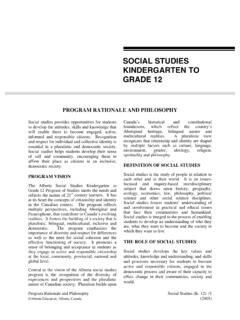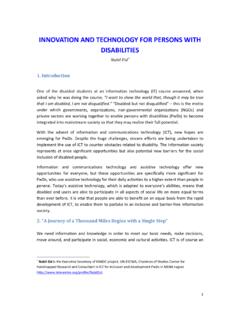Transcription of OECD WORK ON TAXATION
1 OOECD workhjkhjkhjkOECD work ON TAXATION2016-17 OECD work ON TAXATION 2 About the OECD 3 Preface by the OECD Secretary-General 4 Introduction by Pascal Saint-Amans 6 OECD and the G20 9 Reforming international tax rules - BEPS12 Focus on key tax instruments14 Enhancing tax transparency20 Focus on tax and other financial crimes22 Strengthening tax administration23 Focus on Joint International Taskforce on Shared Intelligence and Collaboration25 Supporting domestic resource mobilisation26 Focus on Tax Inspectors Without Borders29 Tax policy32 Focus on tax and the environment33 Consumption taxes35 Who we are and how we work40 Flagship tax publications41 Key links42 OECD legal instruments on tax44 More information on the OECD s work on tax OECD 20172 The mission of the OECD is to promote policies that will improve the economic and social well-being of people around the world.
2 It provides a forum where governments can work together to share experiences and seek solutions to common problems, bringing our expertise to help governments understand the drivers of economic , social and environmental change and support sustainable and balanced growth. At the OECD, officials meet to compare and exchange policy experiences, identify good practices and adopt decisions and recommendations. Dialogue, consensus, and peer review are at the very heart of how the OECD work is wide-ranging. We measure productivity and global flows of trade and investment, and analyse and compare data to predict future trends.
3 We set international standards on a wide range of topics, from agriculture and tax to the safety of chemicals. We also look at issues that directly affect everyone s daily life, like how much people pay in taxes and social security, and how much leisure time they can take. We compare how different countries school systems are readying their young people for modern life, and how different countries pension systems will look after their citizens in old age. Drawing on facts and real-life experience, we recommend policies designed to improve the quality of people s OECD continues to grow: today we have 35 countries, with Latvia becoming its newest member.
4 Accession discussions are also under way with Colombia, Costa Rica and Lithuania. In addition, we work intensively with Key Partners such as Brazil, China, India, Indonesia and South Africa, have dedicated country programmes with Morocco, Peru and Kazakhstan, and have established regional programmes working with South-East Asia, and Latin-America and the Caribbean. Our expertise is called upon regularly by the G20, G7 and APEC; we partner regularly with other international and regional organisations, and draw on a full spectrum of perspectives in our work with regular engagement with business and civil society.
5 The Organisation for economic Co-operation and Development (OECD) TAXATION 3 OECD work ON OECD 2017 Tax is at the heart of our societies. A well-functioning tax system is the foundation stone of the citizen-state relationship, establishing powerful links based on accountability and responsibility. It is also critical for inclusive growth, sustainable development, and well-being, providing governments with the resources needed to invest in infrastructure, education and health, and support social protection systems. In recent decades, globalisation and the pace of economic change have increased, bringing new opportunities and challenges to our societies.
6 Governments are confronted by a world where the effectiveness of domestic policies is increasingly impacted by the external environment. The mobility of people, assets, as well as new business models emerging from the digital world, have all had important implications for the structure and operation of our tax systems. As the world becomes increasingly globalised and cross-border activities become the norm, tax administrations need to work together to ensure that taxpayers pay the right amount of tax to the right the last 50 years, the OECD has led the way on tax issues. This work is the result of global dialogue, now directly involving more than 130 countries and jurisdictions from across the world, representing a diverse range of needs, objectives and contexts.
7 What ties us together however, is a common recognition that a globalised world needs global solutions. This is the context in which the OECD developed a global standard on the Automatic Exchange of Financial Account Information, and a new framework to tackle base erosion and profit shifting (BEPS). The OECD/G20 BEPS Project enables all interested countries and jurisdictions to work together to shut down loopholes and update international tax rules for the 21st cent ur y. Our work on tax represents the OECD at its best: the focal point for an inclusive conversation that leads to world class standards and effective implementation, always recognising the full range of contexts and constraints faced by countries.
8 I look forward to our tax work continuing to deliver tangible results, helping governments create the resilient, stable and sustainable environment needed for more inclusive by the OECD Secretary-GeneralAngel Gurr aOECD Secretary-General OECD 20174 Working together with our members and an ever-growing group of countries representing different levels of development, the OECD has made major advances in recent years to put an end to tax evasion and avoidance, ensuring a stronger and fairer international tax system. These achievements have built on the historical focus of our work on tax to remove undue tax barriers to cross-border trade and investment.
9 Moreover our work on tax policy is increasingly relied upon not only to achieve revenue objectives, but also to meet broader policy goals, such as stemming climate change and spurring innovation. This is opening up exciting new opportunities for policy-makers. The Centre for Tax Policy and Administration (CTPA) is the hub for the OECD s work on tax, supporting the Committee on Fiscal Affairs and its subsidiary bodies, as well as the Global Forum on Transparency and Exchange of Information for Tax Purposes. Our work covers international and domestic issues, across direct and indirect tax matters, and builds on strong relationships with OECD members and the engagement of a large number of non-OECD, G20 and developing countries as well as input from business, labour and civil society.
10 This inclusive approach ensures our solutions are fit for the modern, globalised economy. Our work on tax issues is comprehensive from developing international tax standards, to supporting governments through the implementation process, to undertaking peer reviews to ensure commitments are met, as well as collecting and analysing high-quality revenue data to support the design of tax policy to meet a range of government objectives. Our efforts to tackle tax evasion and address tax avoidance have received significant attention in recent years, building on and balancing our core work to remove undue tax barriers to cross-border trade and investment.

















